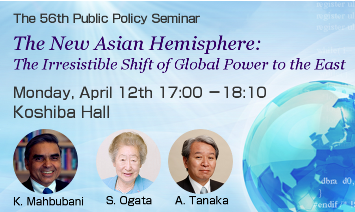The 56th Public Policy Seminar

"The New Asian Hemisphere:
The Irresistible Shift of Global Power to the East"
Venue: Koshiba Hall, Hongo Campus
Date: Monday, April 12th, 2010
Time: 17:00-18:10
Keynote Lecture:
Kishore Mahbubani, Dean/Professor in the Practice of Public Policy, Lee Kuan Yew School of Public Policy, National University of Singapore
Panelists:
Kishore Mahbubani, Dean/Professor in the Practice of Public Policy, Lee Kuan Yew School of Public Policy, National University of Singapore
Sadako Ogata, President, Japan International Cooperation Agency
Akihiko Tanaka, Managing Director, Executive Vice President/Professor, The University of Tokyo
Moderator:
Prof. Keisuke Iida, Graduate School of Public Policy, the University of Tokyo
Language: English
Summary
On April 12, Professor Kishore Mahbubani gave a lecture to GraSPP students and faculty entitled, "The New Asian Hemisphere: The Irresistible Shift of Global Power to the East." The event highlighted the signing of GraSPP's dual degree initiative with the Lee Kuan Yew School of Public Policy, as well as Professor Mahbubani's recent book release in Japan. A panel discussion with Professor Akihiko Tanaka, Executive Vice President of Todai, and Dr. Sadako Ogata, President of the Japan International Cooperation Agency, followed the lecture. Professor Keisuke Iida moderated the event.
Professor Mahbubani began the lecture by summarizing the core thesis of his book: that we have reached the end of the era of Western dominance of world history. He clarified that this changing of power distribution did not signal the end of the West, but rather the return of Asia and reversion to the historic norm. If this is happening, and if his thesis is correct, then we must, as Professor Mahbubani put it, "change our mental maps and be prepared for a changed world." If we do not, conflict may arise.
Indeed, seeking a means of ensuring peace during this transition is one of the three paramount reasons Professor Mahbubani gave for writing the book. Historically, as he pointed out, a shift in power from one region or state to another has led to war, and to avoid this moving forward we must be prepared for a new world order. Also spurring him to write was Asia's state of denial about its own potential, and the West's inability to recognize itself as a source of global problems.
According to Professor Mahbubani the reason for this changing world and power shift from West to East rests in what he terms "the seven pillars of western wisdom." Asia has now replicated and implemented the structures of these seven pillars (free market, mastery of science and technology, pragmatism, meritocracy, culture of peace, rule of law, and education), and has thus begun the process of wealth and power redistribution.
Dr. Ogata, while praising the timeliness and importance of the book, is unconvinced that Asia's economic growth will necessarily translate into more international leadership and responsibility. "One cannot change others without first changing oneself," she said, and worried that differing ideologies in Asian governance may impede its future rise. She was skeptical of the use of "irresistible shift," and although she agreed that Asia is embarking on a new (or, depending on how you look at it, historic) frontier she wondered allowed, "what does Asia's growth really mean?"
Professor Tanaka was in agreement with the general thesis put forth by Mahbubani, and noted the destabilizing potential of Asia's rise as well as the West's psychological unpreparedness for a rebalancing of power. The era of Western domination, he said, corresponded with Japan's era of exceptionalism, and that that as one falls so too does the other. Ironically, as Professor Tanaka pointed out, the rest of Asia is experiencing dynamic growth while Japan's economy stagnates. In this sense, perhaps Japan is embarking on a new, albeit unwanted, era of exceptionalism.
Professor Mahbubani ended the conference by answering questions from the audience. During this Q&A period he highlighted two of his major concerns for future global stability: Islamic tensions and the US/China relationship, as well as his stance that Japan's future is a bright one. Mahbubani noted that while many Japanese seem pessimistic about their future, they should not be. There are, he said "tremendous opportunities for Japan to benefit from Asia's rise."
Program:
| 16:30-17:00 | Registration |
| 17:00-17:05 | Opening Remarks / Prof. Hideaki Shiroyama, Graduate School of Public Policy, the University of Tokyo |
| 17:05-17:20 | Keynote Lecture |
| 17:20-17:50 | Panel Discussion |
| 17:50-18:10 | Questions and Answers |
| 18:10-18:20 | Book signing |
| 18:30-20:30 | Reception (Sanjo Conference Hall 1F, Lounge Harmony) The opening - double degree launching ceremony |
Related Resources
- Profile of Kishore Mahbubani, Dean/Professor in the Practice of Public Policy, Lee Kuan Yew School of Public Policy, National University of Singapore (PDF, 55KB)
- NUS - Lee Kuan Yew School of Public Policy
- Japan International Cooperation Agency
- Seminar Pamphlet (PDF, 1.77MB)
- The Public Policy Seminar Series
